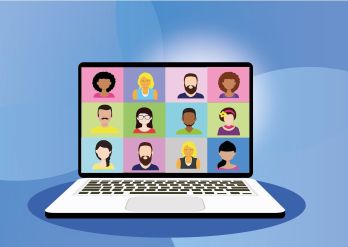Students are experiencing Zoom fatigue but that can be fixed with self-care.

After about eight weeks into the semester I feel burnt out, irritable, mentally and physically drained and exhausted from work and stress. I opted to stay home and attend the majority of my classes online this semester.
Being in my junior year of college is already challenging enough. Being in junior year during a pandemic while taking courses online is a whole other ballgame that brings on challenges of its own.
“Zoom fatigue” is the exhaustion, stress and anxiety that students feel from excessively using virtual and online applications. Psychology Today explains that Zoom meetings are “mentally exhausting” due to the abnormal nature of communicating online as nonverbal social cues such as facial expressions, tone of voice and body language get “lost, distorted or delayed.”
In my experience, I have left many online classes feeling tired with blurry and foggy eyes and sometimes headaches from staring at my screen for so long. I feel like the workload has become heavier because everything is online and that is not a familiar learning style. My energy is drained so much quicker compared to how it would be during a traditional class setting.
Zoom and social cues
Learning in this new format can also be challenging at times as it may be harder to focus, pay attention and retain information. According to Psychology Today, this is due to the unnaturalness of having prolonged eye contact with faces up close on a screen as it is not regular human social nature. Even Zoom social outings can feel like a chore or work.
According to an interview done by BBC Worklife, Gianpiero Petriglieri, an associate professor at Insead, claims that video calls require more effort and concentration compared to normal face-to-face conversations. He explained that it takes more out of us because we have to compensate for social cues that are missing. This takes up a large amount of our energy.

“Our minds are together when our bodies feel we’re not,” Petriglieri said. “That dissonance, which causes people to have conflicting feelings, is exhausting. You cannot relax into the conversation naturally.”
Another factor is that people may be too focused about being on camera, which can quickly become mentally exhausting.
This is something that I struggled with a lot at first. It took a lot of time to get used to being on screen. Knowing that I could be seen on my peer’s screens while looking at several faces all at once was overwhelming. I was more worried about being on camera and I became hyperaware. This made it harder to focus on the actual task at hand and made me more exhausted.
Screen usage
Between classes and homework being online, using my phone to stay in touch with friends and other purposes and occasionally watching TV, I estimate that I am staring at some type of electronic device screen for at least 40 hours a week and it is taking a toll on me.
According to the Mayo Clinic Health System the average time spent on screens before the pandemic ranged from seven to 10 hours a day while the recommended amount of screen time is one hour per day for children aged 2 to 12 and two hours per day for teenagers and adults.
This year is an exception though, as these recommendations are not as achievable now that everything has essentially gone virtual. While this screen time “new normal” has become a function of our daily lives, the negative impact still remains.
Zoom fatigue is real and needs to be recognized. We all need to take care of ourselves now more than ever. This is why it is important to take breaks away from electronic devices. It is important to take part in stress-relieving activities such as exercising, reading and napping in order to refresh yourself.


